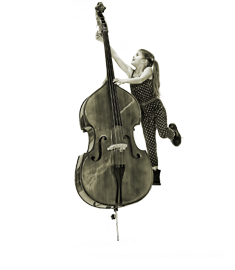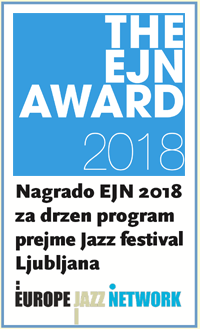Raport
Raport
A festival of such long standing as the Jazz Festival Ljubljana, counting down months to its venerable 60th anniversary next year, is keenly aware that tradition, illustrious names and jazz ‘glamour’ are not enough for a festival ‘to live up to its name’. A festival must be able to find a way to embrace the local music scene, to appeal to national music lovers, not necessarily just jazz enthusiasts, to budding young people who come to a festival to find out what “this jazz really is" and, ultimately, to all citizens who daily pass through the premises that turn into a concert venue for several days each year, and allow themselves to be stopped in their daily errands to listen to the festival soundscape. Thus, in view of the forthcoming jubilee, it was necessary to overhaul the programme with a view to building a community that would keep the festival alive and kicking for at least another sixty years.
"The 59th Jazz Festival Ljubljana is not a senile old man, but a vigorous, strapping middle-aged lad," was how Edin Zubčević, the Festival’s new artistic co-director, and a long-standing Director of the Sarajevo Jazz Festival, summarised the guidelines for 2018. Together with Bogdan Benigar, a seasoned concert promoter, Zubčević devised an adventurous and diversified programme, taking place in various venues, and ranging from the CD Park, Cankarjev dom auditoriums to the CD Club. Before opening officially, the festival spread out to ‘other destinations,’ to the heart of Ljubljana by means of music interventions by sax player Jasna Kolar and students of the Ljubljana Music and Ballet Conservatory, whose live improvisation served to promote the festival. Adventurousness was the 2018 Festival’s buzzword, as on Friday night the European Jazz Network (EJC) presented the Jazz Festival Ljubljana with an award recognising the festival’s adventurous programming, a distinction granted to a host of famous venues in addition to Ljubljana, including Bimhuis, Moers Festival, Tampere Jazz Happening, 12 Points. The ceremony was followed by a performance by Rohey, a soulful Norwegian band. The location of the concert constituted the second crucial element of this year’s festival, which is the building of a jazz community. As many as 10 complimentary concerts were held at the Council of Europe Park, a venue greatly enhanced by its shady trees and soft grass. True to an observation from a passer-by who, taking a good look at the relaxed concert-goers reclining on the grass, commented: "It’s a jazz Woodstock in miniature," the park turned into a veritable meeting place of the (future) devotees of jazz.
In keeping with this endeavour to develop a sense of community, over a half of this year’s appearances featured national artists, starting with the doyen of Slovenian jazz, Zlatko Kaučič, who marked his 40 years in music with a retrospective photo exhibition (festival also included an exhibition by Petra Cvelbar, In Women’s Hands), and whose concert with the December Soul trio turned the CD Park into a serene winter idyll. Another seasoned performer was Aleš Rendla, who provided a rich contrast to Kaučič’s music with his summery, cicadas-emulating sound from his latest release, Sanjarije. With their upbeat tempo, the explosive Lovro Ravbar and Get on Board Collective played music that invited dancing, while the joint project MTF and Sub-lime launched the park venue by dexterously fusing jazz, hip-hop and flamenco. The younger (Slovenian) jazz generation of musicians active in international projects was represented by Lore whose music heavily relates on improvisation mixed with a contemporary interpretation of folk songs, Rok Zalokar and his new trio Port Songs, which explores the concept of port as the melting pot of different cultures, and Bowrain, who fuses acoustic sound with electronica into a colourful kaleidoscope, a composite of classical minimalism and multimedia experimentation that provided for a real musical and visual treat. While unable to perform in the CD Park due to unfavourable weather conditions, off-the-wall Finnish band Elifantree and experimental trio Hermia / Ceccaldi / Darrifourcq Trio nevertheless succeeded in evoking the ‘outdoor mood’ in an auditorium
Slovenian artists also performed in the grand Gallus Hall, a venue that hosted the Jazz Festival Ljubljana’s opening concert – an appearance by Kristijan Kranjčan, one of Slovenia’s most prolific and incisive young artists presenting his new solo project, DrummingCellist that explores the possibilities of two paramount instruments. The opening concert was enhanced by Janez Dovč, an accordionist who weaved intricate, electronically generated musical patterns, and dancers Žiga Krajnčan and Gašper Kunšek. The second concert of the opening night featured bassist Dave Holland, who last appeared at the Jazz Festival Ljubljana more than three decades ago, tabla player Zakir Hussain and saxophonist Chris Potter. In blending jazz with other styles, most frequently incorporating elements of traditional music, the trio provided for the piece of the festival puzzle known as classic jazz. Due to high demand, Gallus Hall hosted another concert on Saturday, festival’s last day. Tunisian oud player and singer Dhafer Youssef enchanted the audience with his evocative sound and fiery compositions, earning a standing ovation for his 90-minute performance of oriental fusion.
On Saturday, after a rewarding programme featuring children’s workshops, a jazz bazaar and a compelling lecture by Francesco Martinelli about the secret link between jazz and Islam, the festival concluded with performances at the CD Club, concerts that tended to boost the festival’s energy rather than serving as its conclusion. A highly engaging potion of jazz grooves, the hypnotic Shake Stew were bursting with energy despite having just returned from an exhausting tour, while Vasko Atanasovski’s Melem featuring Bojan Zulfikarpašić, enraptured the audiences with its a harmonious blend of lyrical jazz and Balkan tunes.
A festival highlight, the British new-wave jazz band Portico Quartet blended classical and electronic instruments, proving that even minimalism can generate a demand for an encore. Goran Kajfes’ Subtropic Arkestra fascinated the proverbially serious jazz audience with their pulsating Afro rhythms, interspersed with Balkan melodies. The concert by one of the most exciting large European impro-jazz ensembles, Lisbon Underground Music Ensemble L.U.M.E., featured a post-concert culinary meeting between Bosnia and Portugal in honour of the former and the current artistic directors.
The CD Park provided an ideal venue for improvised performances by young musicians taking part in the Abeceda workshop curated by Dré Hočevar. Selecting a group of 30 promising talents, the workshop sought to develop and foster national jazz creativity, with the main goal of creating a musical performance based on individual visions of every performer while applying contemporary methodologies, as well as improvisation and experimentation. Abeceda came to a thrilling climax within the context of the Saturday CD Park programme, a manifestation of creativity "freed from the fetters of institutional education".
Hoping that the festival has provided a springboard for at least 30 new jazz talents, which will continue to inform and enrich the Ljubljana festival in years to come, we eagerly look forward to the next edition.


